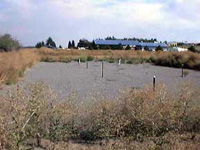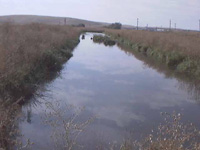 Watershed: Palouse Basin
Watershed: Palouse Basin
Stream Name: Paradise Creek
Date Established: 06/01/1997
Project Status: Complete, ongoing maintenance
Description
The goal of this project was to develop wastewater treatment wetlands to provide tertiary treatment to Moscow Wastewater Treatment Plant effluent and other polluted non-point source runoff that currently drains directly into Paradise Creek. In conjunction with the Idaho Water Resource Research Institute and the City of Moscow, wetland cells were constructed to naturally filter the polluted water through sedimentation, filtration, absorption, microbial metabolism and plant tissue uptake; thus, removing organic matter, excess nutrients, sediment, and trace metals. PCEI hired Elisabeth Brackney, who received her Masters in Fisheries Resources at UI for developing the conceptual design for this project, to consult on the design along with TerraGraphics Environmental Engineering. In addition, PCEI hired Ecosystems Northwest to delineate existing wetlands on the site, which were discovered to have been completely drained and tiled.
In July of 1996, PCEI hired ME Construction of Potlatch, Idaho, to construct six surface flow, one subsurface flow and two natural contour surface flow wetland cells, as well as two biofiltration swales and a stormwater pond. Local community volunteers with UI and WSU students helped PCEI plant the newly constructed cells with 23,860 native herbaceous wetlands plants which were contract grown by Wildlife Habitat Institute of Princeton, Idaho. University students were involved in the design, engineering, construction, and planting phases, which were completed in 1998. PCEI has given tours of the site to classes from both the Universities and to local groups like the Native Plant Society.
Previous Conditions
Cows were grazed on the streambanks and the adjacent fields, and their ?hoof action? contributed sediment to the creek. Little vegetation grew on the steep streambanks, which eroded during high flow events.
Photo History:
 Bullrush and Cattail (9/17/1998): Local community volunteers, with UI and WSU students, helped PCEI plant the newly constructed cells with 23,860 native herbaceous wetlands plants.
Bullrush and Cattail (9/17/1998): Local community volunteers, with UI and WSU students, helped PCEI plant the newly constructed cells with 23,860 native herbaceous wetlands plants.
 Subsurface (9/17/1998): Subsurface wetland cells were created to ensure natural filtration through the winter months.
Subsurface (9/17/1998): Subsurface wetland cells were created to ensure natural filtration through the winter months.
 Cell #3 (9/17/1998): Wetland cells were constructed to naturally filter the polluted water through sedimentation, filtration, absorption, microbial metabolism and plant tissue uptake; thus, removing organic matter, excess nutrients, sediment, and trace metals.
Cell #3 (9/17/1998): Wetland cells were constructed to naturally filter the polluted water through sedimentation, filtration, absorption, microbial metabolism and plant tissue uptake; thus, removing organic matter, excess nutrients, sediment, and trace metals.